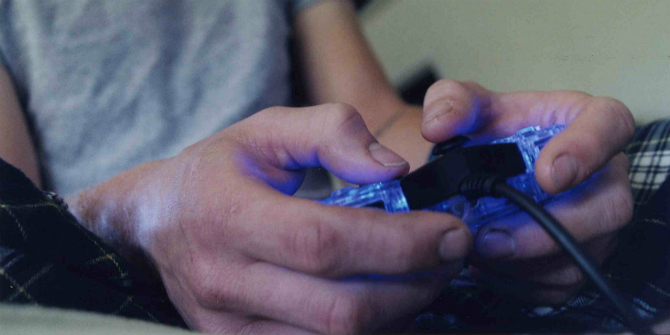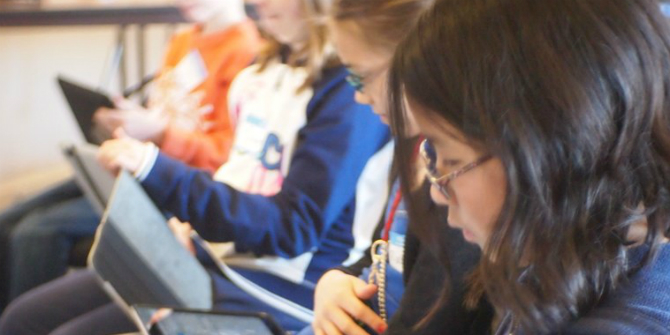 Wondering whether to buy your child a tablet for Christmas but concerned about the risks? Health visitors could play a vital role in advising parents on screen time, but there is currently a lack of evidence-based research or guidance for them to draw upon. Here, Sonia Livingstone and Keely Franklin discuss what health visitors can do to bridge the gap when advising parents. Sonia Livingstone is Professor of Social Psychology at LSE’s Department of Media and Communications and is the lead investigator of the Parenting for a Digital Future research project. Keely Franklin is a qualified adult nurse, health visitor and midwife and has worked in various health professional roles in the NHS for 25 years. Her professional interests include supporting parents with family screen time, health promotion and prevention of childhood obesity.
Wondering whether to buy your child a tablet for Christmas but concerned about the risks? Health visitors could play a vital role in advising parents on screen time, but there is currently a lack of evidence-based research or guidance for them to draw upon. Here, Sonia Livingstone and Keely Franklin discuss what health visitors can do to bridge the gap when advising parents. Sonia Livingstone is Professor of Social Psychology at LSE’s Department of Media and Communications and is the lead investigator of the Parenting for a Digital Future research project. Keely Franklin is a qualified adult nurse, health visitor and midwife and has worked in various health professional roles in the NHS for 25 years. Her professional interests include supporting parents with family screen time, health promotion and prevention of childhood obesity.
What do health visitors need to know about screen time in the families they work with? Although concern about screen media use by very young children is high, and although health visitors are well positioned to advise parents, there is astonishingly little official guidance available, especially guidance which is based on evidence. For example, in the widely used guide, What to Expect, When? there is barely a mention of technology.
Yet in her research [1], Keely Franklin, herself a health visitor, heard plenty of concerns from health visitors about the likely harms, such as:
- ‘Parents use screen time as a way of avoiding [dealing with] bad behaviour.’
- ‘Some children will be left to play alone on a mobile/tablet with little interaction with an adult.’
- ‘Parents appear unaware of the effects of handheld devices.’
- ‘Parents being on their phone when feeding their babies or distracted by phone when talking to their children.’
- ‘In my experience children who scored low on communication often have lots of screen time, particularly with handheld devices.’
The evidence: accompanying screen time with interaction
Are these worries supported by the evidence? In our recent article for the Journal of Health Visiting, we found that:
- The evidence for screen time harms in 0- to 5-year-olds is weaker than often supposed.
- Different families may have legitimate reasons for using digital media.
- Some research suggests a link between speech delay and infants’ use of a handheld device.
- Research suggests that harms are reduced and benefits greater if screen time is accompanied by direct parent-child interaction.
For example, emerging findings from the TABLET Project with 6- to 36-month-olds at Birkbeck Babylab led Celeste Cheung to conclude that although there is a negative link between touchscreen use and sleep, there can be benefits too:
“Active interaction with touchscreens can generate dynamic stimulation, and, if used appropriately, may be just as engaging and cognitively stimulating as traditional toys or books. And even for TV viewing, not all exposure is bad – educationally informed programming can have positive influences on executive function, language and numeracy.”
After reviewing the screen time literature, Alicia Blum-Ross and Sonia Livingstone argued that since media use is no longer optional or dispensable in families’ daily lives, parents would be better advised not to watch the clock but rather to observe their child and ask themselves whether their child is healthy, sleeping, sociable, learning, pursuing interests and so forth. Only if the answers suggest problems that could reasonably be linked to the child’s use of screen media is it likely to be helpful to reduce the child’s screen time. Often, of course, the causes of children’s problems will lie elsewhere.
No official screen time guidance is currently available in the UK (unlike in the US where the advice of the American Academy of Pediatrics has been recently updated), but the Department of Health and Social Care provides physical activity guidelines for Early Years which emphasise the importance of minimising sedentary behaviour. Clearly an update for the UK is now needed – and it’s on its way.
Immediate interventions
What might health visitors (and other professionals working with 0- to 5-year-olds) do in the meantime?
The Parenting for a Digital Future survey found that while one-in-four (26%) parents of 0- to 4-year-olds would ask a health professional when they have a concern about their child in general, far fewer (11%) would turn to them for guidance about their child’s digital technology use. So, first, can health visitors make themselves more approachable on this topic?
Secondly, can health visitors do more to emphasise the importance of parent-child interaction, both directly and in relation to digital content, while avoiding generating parental guilt or anxiety over screen time? Radesky and Christakis reviewed the (largely American) research literature for screen time in early childhood, concluding that parent-child interaction is vital if children are to learn from digital technology:
“For infants and toddlers younger than 24-30 months, the primary way children learn from passive or interactive media is through caregivers co-viewing, teaching them about the content, and repeating this teaching through daily interactions.”
UK research by Plowman and Hancock agrees, showing that effective guided interaction supports a child’s play and learning with technology as long as parents show an interest, ask questions, make suggestions, provide encouragement, praise achievements and help with any frustrations.
Do parents actually do this? The Parenting for a Digital Future survey found that, on average, UK parents ‘sometimes’ share an activity with their child online, talk to them about the content they use or advise them on apps they think are good for them. Doubtless parents could be encouraged to do more.
Third, health visitors could advise on which apps are appropriate or effective for young children, something that parents want guidance on – see here for a helpful checklist of features to look for in good app design for pre-school children.
[1] Franklin K (2018) Healthcare professionals’ opinions on the use of handheld devices in the development of two-year-olds at the two-year review. MSc thesis. High Wycombe: Buckinghamshire New University.
This post represents the views of the authors and not those of the LSE Parenting for a Digital Future blog nor of the London School of Economics and Political Science.





